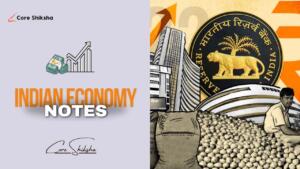Indian Economy notes play an important role in the preparation process of UPSC aspirants and these notes help them to navigate through the complex world of economic principles, policy, and developments. Economy notes are one of the most important sources of knowledge. They help in consolidating vast and difficult economic concepts into easy-to-understand formats. One of the main benefits of economy notes is that they make learning easier. They provide a well-structured framework, covering topics like macroeconomic indicators, microeconomic theories, etc. In addition, economy notes help in effective revision. They help you to reinforce important concepts and stay up-to-date with the latest economic trends.
When it comes to competitive exams such as UPSC, economists notes are invaluable study companions. Not only do they improve your conceptual clarity, but they also help you to analyze economic scenarios and policy implications, as well as global economic trends with more confidence and accuracy and with this article you will get all the notes of economy for your preparation.
Economy Notes of CBSE for Class 1 to12
| Class | Chapter Topics |
| Class 1 Notes | Introduction to Economy |
| Basic Concepts of Needs and Wants | |
| Class 2 Notes | Goods and Services |
| Money and Its Uses | |
| Class 3 Notes | Saving and Spending Money |
| Understanding Budgets and Expenses | |
| Class 4 Notes | Income Sources |
| Banking and Savings | |
| Class 5 Notes | Introduction to Trade and Commerce |
| Types of Markets and their Functions | |
| Class 6 Notes | Indian Economy: An Overview |
| Economic Sectors: Primary, Secondary, Tertiary | |
| Class 7 Notes | Money and Credit |
| Understanding Inflation and Deflation | |
| Class 8 Notes | Indian Economic Development |
| Factors of Production and their Rewards | |
| Class 9 Notes | Understanding GDP and its Components |
| Poverty and its Causes | |
| Class 10 Notes | Consumer Rights and Responsibilities |
| Globalization and Its Impact | |
| Class 11 Notes | Indian Economy on the Eve of Independence |
| Economic Reforms since 1991 | |
| Poverty and Social Exclusion | |
| Class 12 Notes | National Income and Its Measurement |
| Money and Banking System in India | |
| Government Budget and the Economy | |
| Foreign Exchange Rate and Balance of Payments | |
| Economic Planning and Policy in India | |
| Agriculture and Rural Development | |
| Industrial and Infrastructure Development | |
| Sustainable Development and Environment |
Topic- Wise Economy Notes
| Topics | Chapters |
| Introduction to Indian Economy | Overview of Indian Economy |
| Economic Development in India: Pre-Independence Era | |
| Economic Development in India: Post-Independence Era | |
| Economic Planning in India | |
| Economic Reforms since 1991 | |
| National Income and Its Measurement | Gross Domestic Product (GDP) |
| Gross National Income (GNI) | |
| Net National Income (NNI) | |
| Per Capita Income | |
| Money and Banking System in India | Evolution of Money in India |
| Functions of Reserve Bank of India (RBI) | |
| Commercial Banks and their Role | |
| Monetary Policy of RBI | |
| Government Budget and the Economy | – Components of Union Budget |
| – Revenue Budget and Capital Budget | |
| – Fiscal Policy and its Impact | |
| Foreign Exchange Rate and Balance of Payments | Exchange Rate Mechanisms |
| Types of Exchange Rate Systems | |
| Balance of Payments and its Components | |
| Foreign Exchange Reserves | |
| Economic Planning and Policy in India | Five-Year Plans of India |
| NITI Aayog and its Functions | |
| Economic Policies of India: Industrial, Trade, etc. | |
| Agriculture and Rural Development | Importance of Agriculture in Indian Economy |
| Challenges in Agriculture Sector | |
| Government Initiatives for Agricultural Development | |
| Rural Development Programs | |
| Industrial and Infrastructure Development | Industrial Growth and Challenges in India |
| Infrastructure Development in India | |
| Make in India Campaign | |
| Sustainable Development and Environment | Sustainable Development Goals (SDGs) |
| Environmental Policies in India | |
| Climate Change and Mitigation |

